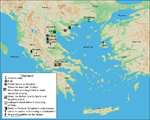- Leibethra
-
Libethra or Leibethra (Ancient Greek: τὰ Λίβηθρα or Λείβηθρα) was a city close to Olympus where Orpheus was buried[1][2] by the Muses.[3] His tomb was later destroyed by a flood of the river Sys.[4] It was a place where the Libethrian Nymphs were worshiped. Remains of Libethra have been found and there exists an archeological site close to Olympus.[5]
The location of Libethra was held to be a favourite place of the Muses, hence their epithet Libethrides (Ancient Greek: Λιβεθρίδες).[6]
The 2nd-century geographer Pausanias writes:[7]
"In Larisa I heard another story, how that on Olympus is a city Libethra, where the mountain faces, Macedonia, not far from which city is the tomb of Orpheus. The Libethrians, it is said, received out of Thrace an oracle from Dionysus, stating that when the sun should see the bones of Orpheus, then the city of Libethra would be destroyed by a boar. The citizens paid little regard to the oracle, thinking that no other beast was big or mighty enough to take their city, while a boar was bold rather than powerful."
The Muses also gathered up the fragments of his body and buried them at Leibethra below Mount Olympus, where the nightingales sang over his grave. Cults of the Muses were also located in Leibethra.[8] Well-known springs and memorials dedicated to Orpheus were there in great number.[9]
References
- ^ Orpheus and Greek Religion (Mythos Books) by William Keith Guthrie and L. Alderlink,ISBN 0691024995,1993,page 34: "...the tomb was near the town of Leibethra on Olympos. ..."
- ^ The Dictionary of Classical Mythology by Pierre Grimal and A. R. Maxwell-Hyslop,ISBN 0631201025,1996,page 333,"... tomb. It was said that this had once been at Leibethra and that an oracle of the Thracian Dionysus had predicted ..."
- ^ Orpheus: Ancient Greek History by Gregory Zorzos,ISBN 1441467777,2009,page 10: "... Muses collected them, and buried them at the place called Leibethra : ..."
- ^ Pausanias, Description of Greece Boeotia,9.30.1,"Immediately when night came the god sent heavy rain, and the river Sys (Boar), one of the torrents about Olympus, on this occasion threw down the walls of Libethra, overturning sanctuaries of gods and houses of men, and drowning the inhabitants and all the animals in the city. When Libethra was now a city of ruin, the Macedonians in Dium, according to my friend of Larisa, carried the bones of Orpheus to their own country."
- ^ Leibethra
- ^ Pliny the Elder, The Natural History ,"To Thessaly Magnesia joins, in which is the fountain of Libethra1. Its towns are Iolcos2, Hormenium, Pyrrha3, Methone4, and Olizon5. The Promontory of Sepias6 is here situate. We then come to the towns of Casthanea7 and Spa- lathra8, the Promontory of Æantium9, the towns of Melibœa10, Rhizus, and Erymnæ11; the mouth of the Peneus, the towns of Homolium12, Orthe, Thespiæ, Phalanna13, Thaumacie14, Gyrton15, Crannon16, Acharne17, Dotion18, Melitæa, Phylace19, and Potniæ20. The length of Epirus, Achaia, Attica, and Thessaly is said altogether to amount to 490 miles, the breadth to 287. 1 Near Libethrum; said to be a favourite haunt of the Muses, whence their name "Libethrides." It is near the modern Goritza."
- ^ Pausanias, Description of Greece Boeotia,9.30.1
- ^ Greek Nymphs: Myth, Cult, Lore by Jennifer Larson,2001,ISBN 0195144651,page 169: "... had cults of the Muses at several sites in Pieria: Pimpleia, Olympos, Leibethra, and perhaps Thourion. Leibethra and Pimpleia were also ..."
- ^ Greek Nymphs: Myth, Cult, Lore by Jennifer Larson,2001,ISBN 0195144651,page 169
- Genealogical Guide to Greek Mythology (Studies in Mediterranean Archaeology, Vol 107) (Hardcover) by Carlos Parada
External links
Categories:- Geography of ancient Pieria
- Geography of ancient Thessaly
- Mount Olympus
- Locations in Greek mythology
- Pierian mythology
- Mythological places
- Ancient Greek archaeological sites in Greece
Wikimedia Foundation. 2010.

